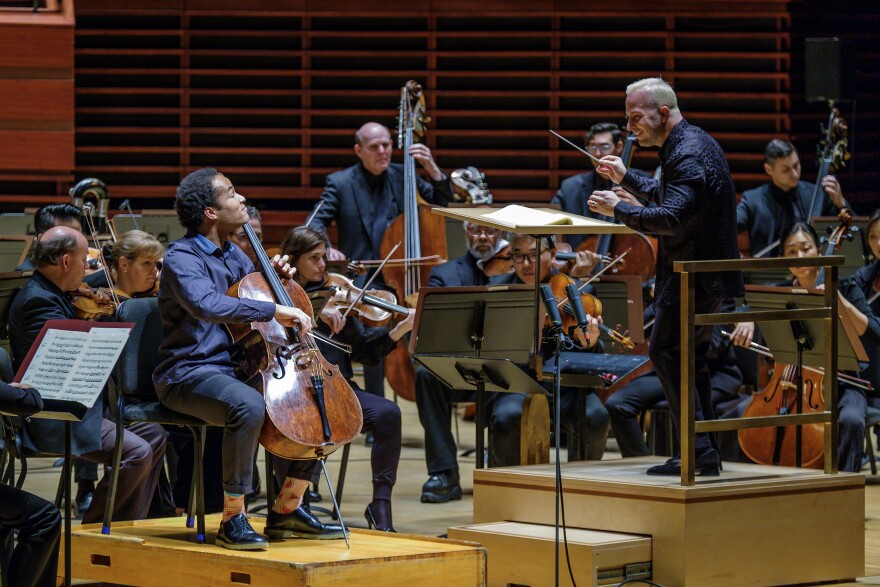The Philadelphia Orchestra has announced the details of its 2024-25 season, featuring a healthy dose of Mahler, a handful of premieres, and works by composers of color who were historically overlooked. Fittingly, for the Orchestra’s 125th season, there will also be programming that honors the history of the organization itself.
Music and artistic director Yannick Nézet-Séguin, in his 13th season with the organization, has stamped its programming with a recognizable personality. A case in point is Opening Night, on Sept. 26, 2024, which will begin with the world premiere of Terence Blanchard’s Suite from Fire Shut Up in My Bones. Drawn from the groundbreaking opera of the same name, which Nézet-Séguin conducted at The Metropolitan Opera in 2021, the suite is a Philadelphia Orchestra co-commission, and foregrounds Blanchard’s fluency in operatic as well as jazz expression, along with a range of other Black music. The evening will also feature Bruch’s Violin Concerto No. 1, with María Dueñas as soloist, as well as Tchaikovsky’s iconic Romeo and Juliet.
That unforced equilibrium between old and new has become a hallmark of the orchestra, and it manifests in a number of other programs from 2024-25. “This season,” says Nézet-Séguin in a press statement, “in addition to performing three of Gustav Mahler’s great symphonies, Ludwig van Beethoven’s iconic Ninth Symphony, and more, we will bring a work by Margaret Bonds to Philadelphia and continue to express our musical admiration for Florence Price, William Grant Still, Louise Farrenc, and Joseph Bologne, Chevalier de Saint-Georges.”
Still’s Symphony No. 2 in G Major, also known as “Song of a New Race,” had its world premiere with The Philadelphia Orchestra under Leopold Stokowski in 1937. It will finally receive another performance by the Orchestra early next year (Jan. 16-18), on a program that also includes Bonds’s The Montgomery Variations and a return performance by virtuoso pianist Yuja Wang.

Riccardo Muti, who led The Philadelphia Orchestra as music director from 1980 to 1992, will return for his first concerts as conductor since 2005. He’ll lead Verdi’s Requiem in three performances, featuring four singers making their Philadelphia Orchestra debuts: soprano Juliana Grigoryan, mezzo-soprano Isabel De Paoli, tenor Giovanni Sala, and bass-baritone Maharram Huseynov. The engagement, Oct. 24 through 26, is timed in alignment with an anniversary: Muti made his own debut with the Philadelphians on Oct. 27, 1972.
Among the other notable guest conductors in the 2024-25 season are Masaaki Suzuki, making his Philadelphia Orchestra debut with Bach Orchestral Suite No. 3 and Haydn’s “London” Symphony No. 104 (Feb. 7 and 8); David Robertson, who’ll lead Nicolas Hodges in Betsy Jolas’s Concerto for Piano and Orchestra (“bTunes”) alongside Leonard Bernstein’s Symphonic Dances from West Side Story and Aaron Copland’s Appalachian Spring Suite (Oct. 18-20); Roderick Cox, who returns to lead Saint-Saëns’s Organ Symphony, Bartók’s Suite from The Miraculous Mandarin, and Martinů’s Rhapsody-Concerto for viola and orchestra, featuring Principal Viola Choong-Jin Chang (Oct. 11 and 13); and former principal guest conductor Stéphane Denève, who will lead an all-French program featuring cellist Gautier Capuçon (Nov. 22 and 23).
Marin Alsop, recently named the new Principal Guest Conductor, will preside over the Orchestra’s New Year’s Eve concert (Dec. 31) as well as an ambitious program (March 13-15) juxtaposing Brahms’ Variations on a Theme of Haydn; Mendelssohn’s Violin Concerto, featuring the returning young phenom Randall Goosby; and the world premiere of Gabriela Lena Frank’s Picaflor (“Hummingbird”), inspired by a Peruvian creation myth.

Frank, the Orchestra’s former Composer in Residence, is one of several figures who will have new work premiered. Another is the Pulitzer Prize-winner Julia Wolfe, whose Pretty, an Orchestra co- commission, will share a Nézet-Séguin-led program with Louise Farrenc’s Symphony No. 1 and Brahms’s Piano Concerto No. 1, featuring Hélène Grimaud (Feb. 27 to March 1). Former Principal Guest Conductor Nathalie Stutzmann will lead the first Philadelphia Orchestra performances of Missy Mazzoli’s Orpheus Undone, alongside Shostakovich’s Symphony No. 5 and Schumann’s Cello Concerto, featuring Edgar Moreau (March 28 and 29).
The Orchestra’s Spotlight recital series will feature three of the brightest stars in classical music, all returning after recent triumphs: pianists Daniil Trifonov (Feb. 26) and Lang Lang (March 23), and violinist Hilary Hahn (May 17). They join an array of artists whose star power resides not just onstage but also behind the scenes — like the prolific Studio Ghibli composer Joe Hisaishi, who will conduct his own works, including the Second Symphony and his Suite from Spirited Away (Jan. 3 and 4); and James Newton Howard, who will conduct some of his scores for M. Night Shyamalan’s films, with the director as emcee, and soloists Jean-Yves Thibaudet on piano and Gil Shaham on violin (Sept. 20).
The season concludes with two likely highlights: a concert featuring Sheku Kanneh-Mason on Shostakovich’s Cello Concerto No. 1, alongside symphonies by Mozart, Prokofiev and Saint-Georges (June 6 and 7); and the Philadelphia Orchestra debut of a heroic Wagner opera. “It brings me great pleasure to bring my other true love, opera, to our stage with once-in-a-lifetime concert performances of Richard Wagner’s exquisite Tristan and Isolde with two of the most incredible voices in music today,” says Nézet-Séguin in a statement, referring to soprano Nina Stemme and tenor Stuart Skelton. “This remarkable artistic endeavor has been an aspiration of mine since I first joined the Orchestra, and I look forward to conducting my first Wagner opera in concert here in Philadelphia.”
For a full schedule, ticketing and information, visit The Philadelphia Orchestra online.


